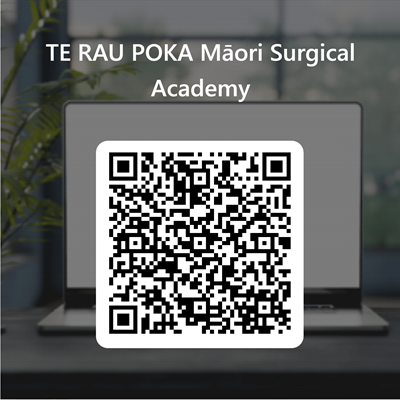2023 | Volume 24 | Issue 6

Earlier this year, RACS Māori Trainee Liaison Lead, Professor Jonathan Koea, announced ambitious plans to realise the College’s vision of a more diverse surgical workforce by increasing the number of Māori surgeons to levels that reflect Aotearoa New Zealand’s (AoNZ) Māori demographic. The aim is to have 150 fully-trained and practising Māori surgeons by 2040, the bicentenary of Te Tiriti o Waitangi—Aotearoa’s founding document. That would equate to around 18 per cent of the 800-odd Kiwi surgeons practising in AoNZ.
Now Professor Koea—Professor of Surgery at the University of Auckland and head of the Upper Gastrointestinal Unit at North Shore Hospital—and the College, with the support of the Foundation for Surgery, are launching Te Rau Poka; the means by which to achieve this ambitious goal.
Te Rau Poka can be seen as a surgical academy for Māori, providing support, advice and mentorship from secondary school to the midpoint of their surgical careers. It is modelled on Massey University’s Te Rau Puawai—one of the most successful academic support programs in Aotearoa.
He whakamarama: the explanation
Te Rau Poka refers to the pursuit of excellence in surgery but in a holistic sense, encompassing all aspects of one’s being, such as physical, mental, spiritual, and cultural. It represents a core value in Māori culture, which emphasises the importance of striving for excellence and maintaining a balanced way of life. This concept can be understood through the pūrakau (legend) of Tāne’s journey to the heavens.
The strategy
Te Rau Poka provides support and guidance to Māori interested in surgical careers, creating a pipeline of tauira (students) from secondary school onwards to surgical leadership roles.
While the initiative is only being announced now, many of the ways it is going about achieving this are already in progress. Some of the key strategies include:
|
Secondary school |
partnering with Pūhoro STEM Academy, which encourages year 11, 12 and 13 tauira Māori into the subjects of science, technology, engineering, and mathematics (RACS involvement with Pūhoro has been taking place for at least two years now) |
|
Medical school |
building relationships with tauira Māori via partnership with Te Oranga, Māori Medical Students Association, and faculty at both of Aotearoa New Zealand’s medical schools |
|
Post-graduate |
Establishing a nationwide hospital-based network to support PGY1 and 2 Māori doctors assisting Māori doctors to meet the criteria for entry into surgical training (this work is being led by Dr Lincoln Nicholls who has been successfully running wānanga [conferences] for prospective Trainee candidates) |
|
Surgical Trainee |
holding regular hui (meetings) with Māori in surgical training (the first online quarterly catch up was in December 2022 and the inaugural face-to-face biennial hui for Indigenous Trainees and surgeons on both sides of the Tasman took place in July 2023) supporting Māori Trainees in preparing for the FEX |
|
Fellowship |
advising in the selection of post training Fellowship pathways assisting in career planning including placements in surgical consultant positions in Aotearoa New Zealand. |
The recruits
Te Rau Poka now includes the current 28 Māori surgical Trainees as well as a number of doctors who have indicated an interest in surgical careers. One in five tauira (participants) at the Te ORA – Māori Medical Practitioners conference in September signed up.
The webpages for Te Rau Poka are under development. In the meantime, if you know of or are a tauira Māori tākuta (Māori medical student) or Maōri tākuta (Māori doctor) interested in a surgical career, we would like to help.
Sign up via the QR code or through contacting the RACS Aotearoa New Zealand office: [email protected].
